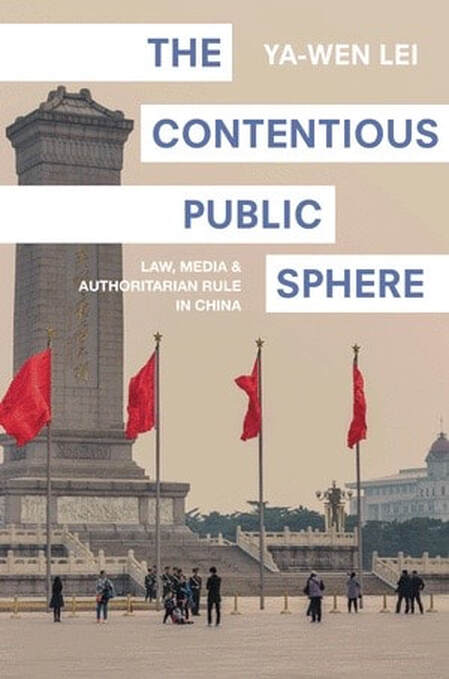
The Gilded Cage: Technology, Development, and State Capitalism in China (Princeton University Press, November 2023)
- Bronze medal, 2024 Axiom Business Book Award, the International Business/Globalization category.
- 2024 Max Weber Book Award, Organizations, Occupations, and Work (OOW) section of the American Sociological Association (Honorable Mention).
- 2024 Asia/Transnational Book Award, Asia and Asian American Section of the American Sociological Association.
- 2024 Best Book Award, Communication, Information Technologies, and Media (CITAMS) of the American Sociological Association.
- 2024 Robert K. Merton Book Award, Science, Knowledge, and Technology (SKT) of the American Sociological Association.
- 2024 Walter Channing Cabot Fellowships, Harvard’s Faculty of Arts and Sciences
Book interview conducted by Jonathan S. Landreth for The Wire China
Book interview conducted by Dorinda (Dinda) Elliott
Table of contents
How China’s economic development combines a veneer of unprecedented progress with the increasingly despotic rule of surveillance over all aspects of life
Since the mid-2000s, the Chinese state has increasingly shifted away from labor-intensive, export-oriented manufacturing to a process of socioeconomic development centered on science and technology. Ya-Wen Lei traces the contours of this techno-developmental regime and its resulting form of techno-state capitalism, telling the stories of those whose lives have been transformed—for better and worse—by China’s rapid rise to economic and technological dominance.
Drawing on groundbreaking fieldwork and a wealth of in-depth interviews with managers, business owners, workers, software engineers, and local government officials, Lei describes the vastly unequal values assigned to economic sectors deemed “high-end” versus “low-end,” and the massive expansion of technical and legal instruments used to measure and control workers and capital within them. She shows how China’s rise has been uniquely shaped by its time-compressed development, the complex relationship between the nation’s authoritarian state and its increasingly powerful but unruly tech companies, and an ideology that fuses nationalism with high modernism, technological fetishism, and meritocracy.
Some have compared China’s extraordinary transformation to America’s Gilded Age. This provocative book reveals how it is more like a gilded cage, one in which the Chinese state and tech capital are producing rising inequality and new forms of social exclusion.

The Contentious Public Sphere: Law, Media and Authoritarian Rule in China (Princeton University Press, 2018)
The Contentious Public Sphere in China shows how the Chinese state drew on law, marketized media, and the internet to further an authoritarian project of modernization, but ended up inadvertently creating a nationwide contentious public sphere in China—one the Chinese state must now endeavor to control.
Since the mid-2000s, public opinion and debate in China has become increasingly common and consequential, despite the ongoing censorship of speech and regulation of civil society. How did this happen? In The Contentious Public Sphere in China, Ya-Wen Lei shows how the Chinese state drew on law, the media, and the internet to further an authoritarian project of modernization, but in so doing, inadvertently created a nationwide public sphere in China—one the state must now endeavor to control. Lei examines the influence this unruly sphere has had on Chinese politics and the ways that the state has responded.
Using interviews, newspaper articles, online texts, official documents, and national surveys, Lei shows that the development of the public sphere in China has provided an unprecedented forum for citizens to influence the public agenda, demand accountability from the government, and organize around the concepts of law and rights. She demonstrates how citizens came to understand themselves as legal subjects, legal and media professionals began to collaborate in unexpected ways, and existing conditions of political and economic fragmentation created unintended opportunities for political critique, particularly with the rise of the internet. The emergence of this public sphere—and its uncertain future—is a pressing one with important implications for the political prospects of the Chinese people. Investigating how individuals learn to use public discourse to influence politics, The Contentious Public Sphere in China offers new possibilities for thinking about the transformation of state-society relations.
- Winner of the 2018 Distinguished Book Award, Sociology of Law Section of the American Sociological Association
- Winner of the 2018 Gordon Hirabayashi Human Rights Book Award, Human Rights Section of the American Sociological Association
- Winner of the 2014 American Sociological Association Best Dissertation Award
The Contentious Public Sphere in China shows how the Chinese state drew on law, marketized media, and the internet to further an authoritarian project of modernization, but ended up inadvertently creating a nationwide contentious public sphere in China—one the Chinese state must now endeavor to control.
Since the mid-2000s, public opinion and debate in China has become increasingly common and consequential, despite the ongoing censorship of speech and regulation of civil society. How did this happen? In The Contentious Public Sphere in China, Ya-Wen Lei shows how the Chinese state drew on law, the media, and the internet to further an authoritarian project of modernization, but in so doing, inadvertently created a nationwide public sphere in China—one the state must now endeavor to control. Lei examines the influence this unruly sphere has had on Chinese politics and the ways that the state has responded.
Using interviews, newspaper articles, online texts, official documents, and national surveys, Lei shows that the development of the public sphere in China has provided an unprecedented forum for citizens to influence the public agenda, demand accountability from the government, and organize around the concepts of law and rights. She demonstrates how citizens came to understand themselves as legal subjects, legal and media professionals began to collaborate in unexpected ways, and existing conditions of political and economic fragmentation created unintended opportunities for political critique, particularly with the rise of the internet. The emergence of this public sphere—and its uncertain future—is a pressing one with important implications for the political prospects of the Chinese people. Investigating how individuals learn to use public discourse to influence politics, The Contentious Public Sphere in China offers new possibilities for thinking about the transformation of state-society relations.
